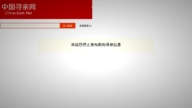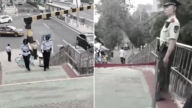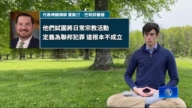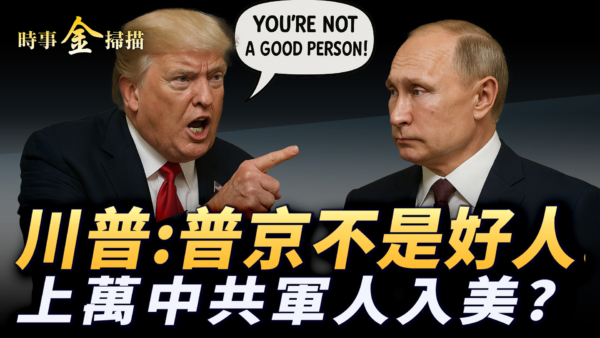【新唐人2013年02月25日讯】日前,中共政治局会议讨论了国务院机构“大部制”改革方案,并决定将方案提交即将召开的十八届二中全会讨论。大陆媒体透露,这次国务院内阁改组,重点在于强化市场监管和整合完善交通运输等领域的管理体制,但民众期待的“大能源”、“大文化”和“大体改委”等,并不在其中。
据《新华社》报导,中共总书记习近平在2月23号主持召开了政治局会议。会议讨论了《国务院机构改革和职能转变方案(草案)》稿。
草案内容包括:民政部扩大社会管理等方面的权责﹔国务院食品安全委员会办公室与现有的食品安全监管部门进行整合,成立专门的市场秩序监管部门﹔国家海洋局扩权,强化海洋综合管理许可权﹔而各界呼吁最多的铁道部与交通运输部也有可能进行整合。
大陆《财新网》认为,本轮大部制的所谓最大“惊喜”,是全国食品安全监管改革,有可能设立一个名为“市场秩序监管总局”的机构,并把食品安全交由地方政府负总责,减少中央政府干预。
当前中国大陆有毒食品泛滥成灾,环境也遭到严重污染。对于“大部制”能否真正解决这个民生问题,旅美的中国社会问题研究人士张健表示﹕“根本不可能”!
旅美中国社会问题研究人士 张健:“在中国解决食品安全问题,就像解决贪污腐败一样,在这个时刻已经病入膏肓,无药可医,除非这个体制改变。这个体制存在的一天,就会有毒奶粉,就会有毒水、毒空气。只有这个体制彻底的崩溃瓦解,还政于民的时候,中国所有的问题都会迎刃而解,无论是体改问题、食品安全问题。”
《财新网》还认为,本轮“大部制”改革最大的遗憾,是“新体改委”被搁置。在此之前,大陆学术界普遍寄望于打破政府自身利益倾向,重新成立类似于国家体改委的实体性改革协调机构,牵头推进经济体制改革。
旅美中国社会问题研究人士 张健:“新体改委被搁置,这是大家觉得好像匪夷所思的事情。认为习近平当选之后,为什么对政治体制改革不进行呢?也可以看到中共历来所作的表现,中共对体制改革的需求,就是要延续它的统治,去盘剥人民,去窃取国有资产,这就是中共的所作为。”
另外,“国家海洋局”将获得扩权,以强化海洋管理权限﹔此举被视为是针对东海和南海的主权纠纷。不过,民众期待的能源部、文化部、广电部、与体育总局等合并,却都没有列入这轮“大部制”范围。
对于各界呼吁最多的铁道部与交通部的合并,北京独立学者章立凡对香港《苹果日报》表示,铁道部早在多年前已经计划并入交通部,但遭到时任铁道部长刘志军的强力反对,加上江泽民包庇,铁道部俨如独立王国,无人敢动﹔现在刘志军已经因为贪腐落马,各界要求撤并铁道部的呼声日高,这次铁道和交通部的改组,将是判断改革力度的标志之一。
不过“中国社会民主党”中央委员会主持人刘因全也指出,长期以来,中共官员腐败严重、效率低下的问题得不到解决,是因为人民没有实质的监察权。而专制体制下,行政部门的修修补补不能解决根本问题。
“中国社会民主党”中央委员会主持人 刘因全:“像大部制,进行一些体制的合并调整,多少可能提高一些效率,这方面的作用会有一些。但是不可能从根本上解决中国的体制问题,更不可能解决人民普遍反感的政治腐败、效率低下、官僚主义这一些问题。”
一位接近方案讨论的专家还向《财新网》透露,草案仍然存在变化的可能,提交十八届二中全会讨论之后,“大部制”改革方案才有望“定盘”。
采访/常春 编辑/李明飞 后制/陈建铭
Draft of the “Big Department System” Exposed Expected “Regime Reform Committee” Might Abort
Recently, the reform draft of the “Big Department System”
was discussed in the Political Bureau conference.
The draft will be submitted to the approaching
second plenary meeting of the 18th CCP Central Committee for further discussion.
As disclosed by China’s media, the re-organization of the
State Council aims to strengthen market supervision and
to improve administrative management on
the transportation system.
Nevertheless, the reform that people would like to see on
“energy”, “culture” and the establishment of a “regime reform committee” are not part of the re-org.
As reported by the state-run “Xinhua News Agency”,
Xi Jinping held a Political bureau conference on February 23.
In the conference, the attendees discussed the draft of
“Structure Reform and Function Transformation of the State Council” (Big Department System).
The content of the draft includes: Ministry of Civil Affairs’
duty in social administration will be enlarged;
Food Safety Committee of the State Council will be
merged with Food safety Supervision Department;
a new , Market Supervision Department,
will be established;
power of the National Bureau of Oceanography will
be enlarged, and comprehensive marine management will be strengthened;
the Ministry of Railways and the Department of
Transportation might be merged.
“Caixin.com” stated that the so-called “biggest surprise” is
reform on national food safety supervision.
It’s possible that a new structure named
“Market Supervision Administration” might be established.
Local governments will be responsible for food safety,
with little intervention from the central government.
Currently, poisoned food is widely rampant in mainland China.
Pollution is destroying the environment.
Is it possible that this reform can solve the real
living problems of the Chinese people?
Zhang Jian, Scholar in China’s social issues, claimed that
it will be impossible.
Zhang Jian: “In China, solving food safety problems is
as challenging as solving corruption problems.
Up to now, it’s already been a wreck and rotten to the core.
The political regime must be reformed; otherwise,
there will be no hope of changing anything.
As long as the communist regime exists another day,
there will be poisoned milk powder, poisoned water and poisoned air.
Only when the communist regime collapses,
can all issues in China be solved.”
“Caixin.com” stated that the biggest regret of
the proposed reform is that “the Committee of Regime Reform” itself aborted.
The academic circles in China had been hoping that
the government could put aside its own interest and
establish a structure that can lead and advance
reform in China’s economic system.
Zhang Jian: “People cannot understand why ‘the
Committee of Regime Reform’ was put aside,
they wonder why Xi Jinping is not continuing
political reform after taking office.
Based on the facts, the conclusion can be drawn that
the subject of political reform is only raised by the communists as an aid in maintaining rule.
This means that they can continue exploiting people and
stealing national property.
This is exactly what the Chinese Communist Party has
been doing for years.”
In the draft, power of the National Bureau of Oceanography
will be enlarged to strengthen marine management.
This move was seen as related to China’s East Sea and
South Sea sovereignty dispute.
Nevertheless, the Department of Energy, Ministry of Culture,
Radio and Television Department,
and the State General Administration of Sports
were not listed in the draft.
What people would like to see most is the combination of
the Ministry of Railways with the Department of Transportation.
Zhang Lifan, an independent scholar in China, told Hong Kong’s
“Apple Daily” that it had been part of the plan that
the Ministry of Railways would have been merged into
the Department of Transportation years ago.
However, the plan was strongly opposed by Liu Zhijun,
head of the Ministry of Railways at the time.
With support from Jiang Zemin, the Ministry of Railways
is like an independent kingdom and nobody dares to touch it.
Liu Zhijun has fallen due to corruption, and people are
calling for the removal of the Ministry of Railways and
for it’s merging with the Department of Transportation,
this last will be a sign of the potency of the reform.
Liu Yinquan, Director of the Central Committee of the
“Social Democratic Party of China”, pointed out that
the root problems of corruption and inefficiency of
China’s officials cannot be solved through repairing the administration structure here and there.
The main reason is that people don’t have any real
supervisory power in such an authoritarian system.
Lin Yinquan: “The reform of combining and adjusting
some government units, to a certain extent,
an improve the efficiencies of the officials involved.
However, it cannot solve the root problems of
China’s political system.
It’s impossible for it to solve the problems of corruption,
inefficiency and bureaucracy that people are most against ”
A specialist involved in discussion of the Draft disclosed to
“Caixin.com” that it’s possible that the draft would be changed.
Only after it is discussed in second plenary meeting of the
18th CCP Central Committee, will it be finally determined.





























